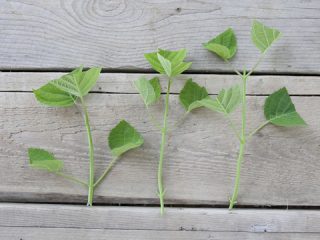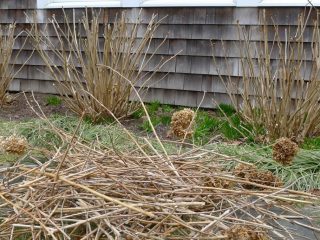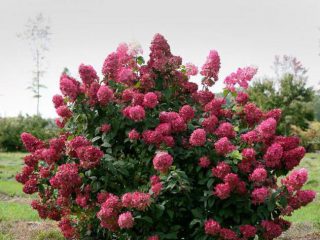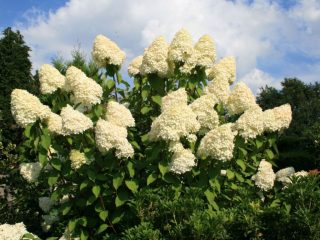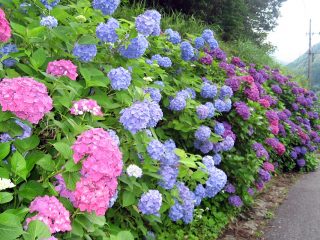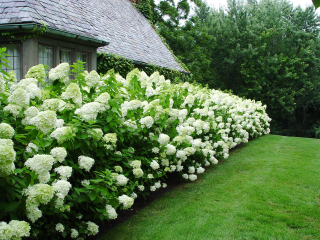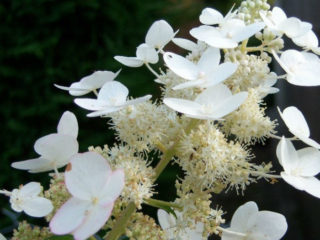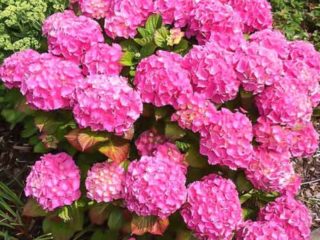Content
Hydrangea Silver Dollar is one of the most popular plant varieties among gardeners. The shrub is distinguished by its unpretentiousness to the soil and tolerates harsh winters and hot summers. It has high resistance to fungal diseases and insect damage.
Description of the hydrangea variety Silver Dollar
Hydrangea variety Silver Dollar is a spreading shrub with a lush crown. In adulthood it reaches up to 1.5 m in height and up to 2.5 m in diameter. This must be taken into account when planting Silver Dollar hydrangea on the site: enough space should be allocated for the shrub among other plantings.
The species belongs to the group of ornamental perennials. The plant has straight, even shoots with dark green oblong leaves, slightly pointed at the edges. Inflorescences are smooth, pyramidal.Their bases are slightly expanded, with a green color that turns white closer to the edges.
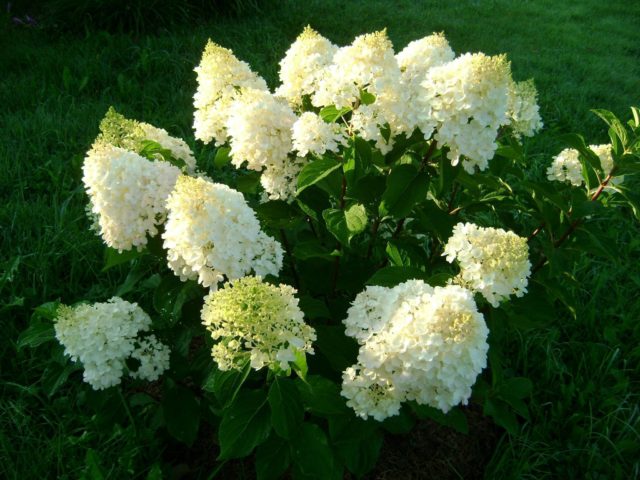
Silver Dollar is characterized by large light flowers that turn lilac or slightly pinkish in autumn
During flowering (from mid-July to September), the inflorescences become heavier and denser in structure. Due to its unpretentiousness, the variety is suitable for cultivation in containers. The plant does not need a garter.
You can see the external differences in more detail in the video:
Hydrangea Silver Dollar in landscape design
Hydrangea Silver Dollar is one of the most suitable varieties for composing mixborder compositions. For this, gardeners use more than three shrubs.
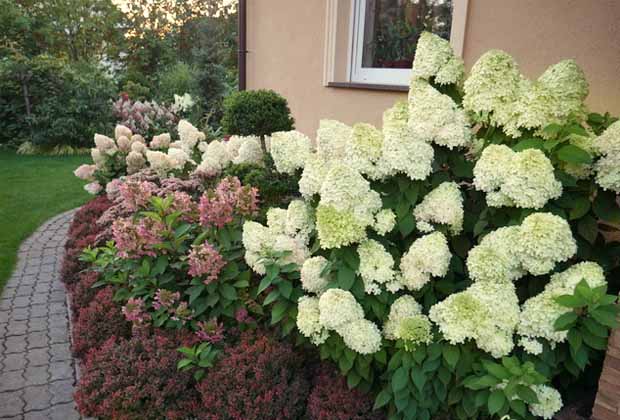
The naturally spreading form, as well as the airy large flowering of plants, give the site a wave-like shape, emphasizing its dimensions.
The multi-colored tops of Silver Dollar hydrangeas go well even with coniferous specimens.
Winter hardiness of hydrangea Silver Dollar
Hydrangea Silver Dollar has a fairly high level of winter hardiness. Can withstand temperatures down to -25 in winter OC and is able to grow and develop normally without additional shelter in temperate climates. However, maintaining the crop in the regions of the Urals or Siberia will not be possible without additional protection, since in these areas the temperature can drop to -30 OWITH.
Before covering, faded inflorescences must be removed, and the soil under the bush should be sprinkled with hay or dry leaves. After this, you should build a wire frame over the plant, wrap it with film, and place a layer of spruce branches on top.
Planting and caring for Silver Dollar hydrangea
Despite all the unpretentiousness of the Silver Dollar hydrangea, keeping the plant on the site has several features and nuances. It is necessary to choose the right place and soil for planting, and also strictly adhere to the rules of watering and feeding the bush.
Selection and preparation of a landing site
Hydrangea Silver Dollar is not picky about the composition of the soil: the crop can be planted in loamy, slightly acidic and fertile soil. However, the shrub does not take root well in calcareous soil, so it needs to be more saturated with humus and peat before planting.
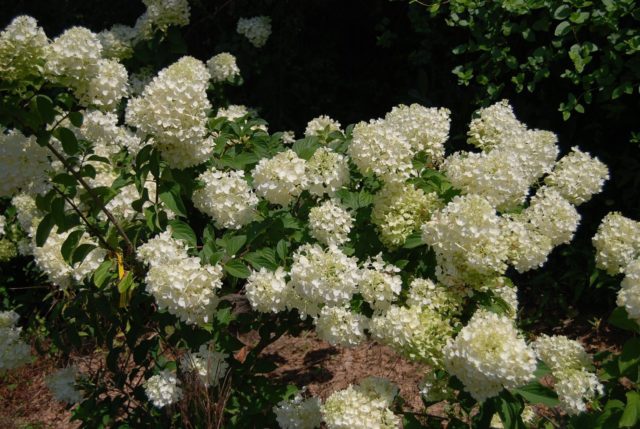
Silver Dollar grows and develops best in slightly shaded areas
Landing rules
Hydrangea of the Silver Dollar variety should be planted in a pre-prepared hole, measuring from 30*30*30 cm. When planting in slightly acidic and acidic soil, a mixture of soil, humus and sand is first poured into the hole.
The composition of the soil must correspond to the following proportions:
- 2 parts of garden soil;
- 1 part humus;
- 1 part sand.
When planting a shrub in soil with a neutral reaction, a deeper planting hole with parameters from 50*50*50 cm will be required. In this case, it is necessary to use soil containing:
- peat;
- garden/leaf soil;
- sand;
- humus.
After the Silver Dollar hydrangea is placed in the hole, its roots must be straightened and covered with soil. It is important to monitor the position of the root collar: it should not be buried too deeply.After planting, the shrub must be watered regularly, not forgetting to mulch the tree trunk with sawdust, crushed tree bark, and peat.
Watering and fertilizing
The correct watering and fertilizing scheme plays a significant role in the development of Silver Dollar paniculata hydrangea. In summer, the plant must be watered daily or every other day (depending on the air temperature) with a large volume of water - 2-3 buckets per bush. You need to proceed from the size of the plant itself.
To slow down the process of moisture evaporation, it is necessary to mulch the soil under the hydrangea using pine bark, pine needles, shavings or sawdust.
It is strictly not recommended to water Silver Dollar with chlorinated water, as this can cause foliage chlorosis. The best option would be to use settled water: to do this, you need to collect several buckets and leave them in the sun for a while. When the liquid becomes warm and the chlorine evaporates, you can water the bush with it. This should be done twice a day, in the morning and evening. In this case, it is important to pour the liquid under the root so that it does not come into contact with the foliage and inflorescences.
The time for the very first feeding of paniculata hydrangea is in the spring, namely in April. A small portion of nitrogen mixed in irrigation water is added to the soil. After this, at the end of May, the soil under the plant is fertilized with potassium solution (in the proportion of 1 tablespoon per bucket of water). It is necessary to apply complementary foods along the entire perimeter of the crown under the root system.
Another feeding should be done during budding using a potassium-phosphorus solution (2 tablespoons of the substance per bucket of water).It is also applied under the root system or simply sprinkled under the bush before watering or rainfall.
Final fertilizing with the same solution is useful at the end of flowering. To do this, hard water needs to be slightly acidified with vinegar or citric acid (manganese solution is also suitable).
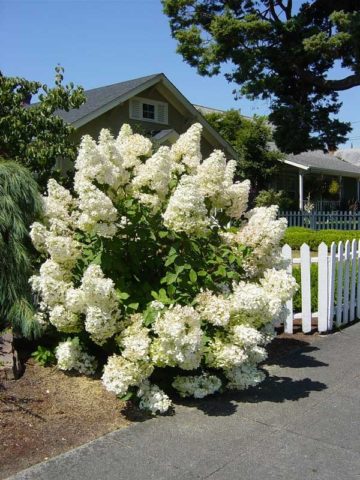
Proper watering and fertilizing increase the resistance of paniculata hydrangea to hot summer days, as well as severe frosts in winter.
Pruning Hydrangea paniculata Silver Dollar
It is necessary to trim the Silver Dollar variety in the spring, before the process of active sap flow. Spring pruning gives the bush the correct shape and removes all the shoots that have frozen over the winter. In autumn, it is necessary to remove faded inflorescences from hydrangeas, which can bend under the weight of snow piles.
Pruning is also necessary for thinning: all small and weak shoots growing along the plant are cut off. Other branches are removed only by 1/3 for the growth of new ones with inflorescences.
Anti-aging pruning is also carried out on perennial specimens with old shoots and poor inflorescences. To do this, in the autumn, all branches of the bush are removed. The root system is covered for the winter. In spring, new, strong shoots and inflorescences appear from the branches.
Preparing for winter
You need to start preparing for the winter period in mid-autumn. Then the Silver Dollar root system is sprinkled with dry leaves or hay. There is no need to cut off the shoots themselves, as new inflorescences should appear on them.
If the winter is too harsh for the plant, you can create a special frame from boards, sprinkle it with dry leaves on top and cover it with film or cloth.
Propagation of hydrangea Silver Dollar
Hydrangea paniculata Silver Dollar is propagated using vegetative methods: cuttings, dividing the bush or using layering.
The first option is the simplest and most common among gardeners, since plant cuttings can be obtained in unlimited quantities during the pruning process. They are cut into small pieces of 15 cm and planted in a container where rooting will take place. The plant quickly takes root, but replanting into the ground can only be done in the spring of next year.
Shrub cuttings are obtained from the longest branches in the lower part:
- The branch needs to be cut in the middle (near the bud) and a match placed in the resulting cut.
- After this, dig the cuttings into the ground at the cut site and water well so that the plant can take root in the fall.
- In winter, the cuttings are located next to the mother plant, and when spring comes they must be transplanted to a separate area.
The method of dividing the bush can be used only on very large and overgrown hydrangeas and only with further replanting.
Diseases and pests
One of the main advantages of the Silver Dollar variety is its high resistance to fungal diseases. The only dangerous disease is foliage chlorosis. Often the reason for its appearance is improper care of the bush.
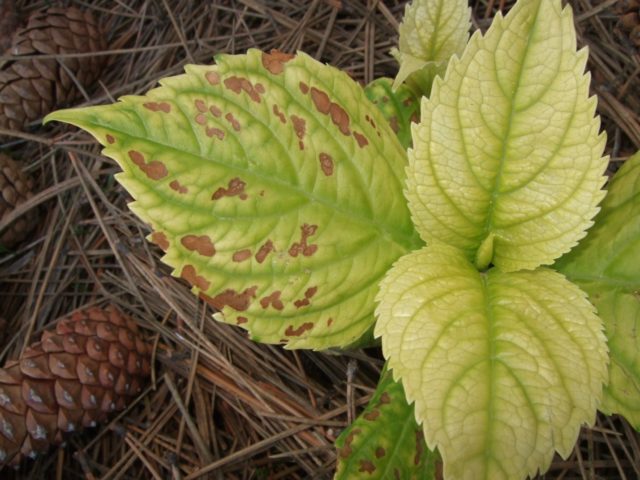
The initial symptom of the disease is lightening, and a little later – yellowing of the leaves.
Chlorosis can lead to excessive fragility of branches and inflorescences, and as a result - to the complete death of the plant.
To eliminate the disease, you need to treat it several times with potassium nitrate. To prepare the solution, you need to mix 30-40 g with 10 liters of filtered water. After 2-3 days you should fertilize with iron sulfate.The solution is prepared in a similar way.
Conclusion
Hydrangea Silver Dollar is one of the most common varieties of shrubs. It is distinguished by its unpretentiousness to the soil and planting site, and also has high tolerance to sudden temperature changes and various pests. The only dangerous disease for the plant is foliage chlorosis, which can be eliminated with a solution of potassium nitrate.
